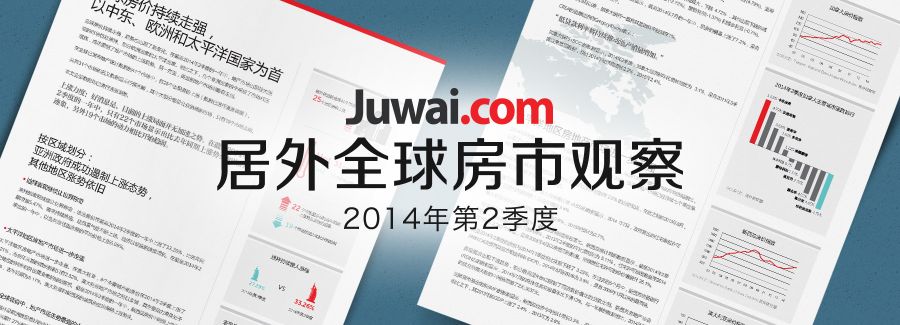亚洲新闻
- 主页
- 新闻
- 亚洲新闻
You've successfully copied this link.
Q2 2014 Global Property Index Report for Chinese released

We’ve just released the Juwai.com Global Property Index Report for Q2 2014, designed specifically to equip Chinese buyers with research for overseas real estate investment.
Global housing prices continued to boom in Q2, with a new geographical twist. Housing markets surged in Dubai, parts of Europe and the Pacific.
Contrarily, the US and several Asian countries – where governments implemented cooling measures – have seen weakening housing markets.
Of the world’s 41 markets that publish housing statistics, 28 markets saw rising home prices. Nominal figures show rising prices in 34 countries, and declines in only 10 countries. Some highlights include:
Middle East
Dubai continues to wow the world, with home prices rising 33.26% during the year to Q2 2014, and 5.47% in the latest quarter. Demand and construction activity remains strong, and the economy is growing at a healthy pace.
Pacific
Home prices in Australia's eight major cities rose 7.21% during the year to Q2 2014 – driven by record low interest rates and strong demand from foreign homebuyers. New Zealand housing prices rose 6.66% during the year to Q2 2014. Construction activity in both contries continue to rise.
Europe
5 of the 10 strongest housing markets were in Europe. Estonia was the best performer, with home prices surging by 16.72% during the year to Q2 2014, fuelled by strong property demand and an improving economy. The UK saw a strong turnaround, with home prices rising by 9.68% YoY in Q2 2014, its biggest increase since Q4 2004. Ireland, Turkey and Iceland were also among the top ten markets.
North America
US housing prices slowed, with home prices rising by 4.1% during the year to end-Q2 2014, the lowest its been since Q1 2013. Nevertheless, US residential construction activity and property transactions are rising. In Canada, housing prices in 11 major cities rose by 2.03% during the year to Q2 2014. This is a rise from the meagre 0.65% YoY rise during the same period last year, despite market cooling measures.
Asia
Asian housing markets are losing momentum. Only 2 of the 10 Asian markets that publish figures performed better in Q2 2014 than the previous year.
South Korean home prices fell by 0.37% YoY in Q2 2014, an improvement from the annual 2.59% decline in Q2 2013, while Vietnam’s residential property prices dropped 0.03% during the year to Q2 2014, up from 3.55% YoY declines a year earlier.
China’s property market, on the other hand, is on the verge of a slump, with prices for second-hand residential buildings in Beijing rising just 2.31% during the year to Q2 2014, a sharp slowdown from the robust 11.11% growth over the same period last year.
Conclusion: Overall, Q2 research show that many housing markets around the world are now considered overvalued, and Asian governments in particular, are imposing cooling measures to avoid a repeat of the past.
However, housing markets in much of the rest of the world are rising faster than before.
This is good news for Chinese buyers who are increasingly more daring with their real estate investments, putting their money towards less traditional markets.
For many international agents on top of global trends, it’s an opportunity to have Chinese buyers with their eye on new markets.
喜欢这篇文章?免费注册,获取居外亚洲市场的最新资讯!
排序
- 2023
- 2022
- 2021
- 2020
- 2019
- 2018
- 2017
- 2016
- 2015
- 2014
- 2013
- 2012
标签
- australia
- china
- chinese buyers
- investment
- juwai
- property
- real estate
- residential
- united kingdom
- united states
Thank you for subscribing to Juwai News!
Sign up for a Juwai Account now for free to enjoy FREE download access to country-specific reports on Chinese property investments.
Do you want to sign up now? Or continue if you have already signed up or you will do it later.


